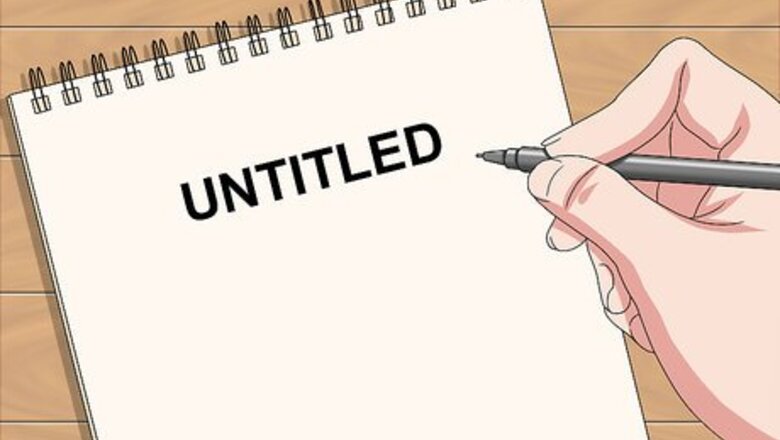
views
Preparing the Poem for Publication
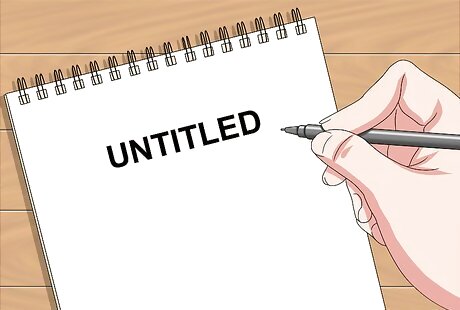
Title the poem. Pick a title that you feel is representative of the poem as a whole. Go for a title that will be eye catching and engaging to the reader. It should tell the reader a little something about what the poem is about. You can always call the poem “Untitled” if you’d prefer not to give a specific title. Do not leave the title blank, however, as publishers may not be interested in a poem that's harder to promote.

Confirm that there are no spelling or grammar errors. Read the poem aloud to yourself to check that there are no obvious errors, such as a misspelled word or a missing punctuation mark. Check that the poem is error-free and at its best, thus gaining a better chance of getting published. You can also ask a friend or family member to read over the poem to check for any problems. If issues are found, make changes so the poem is error-free.
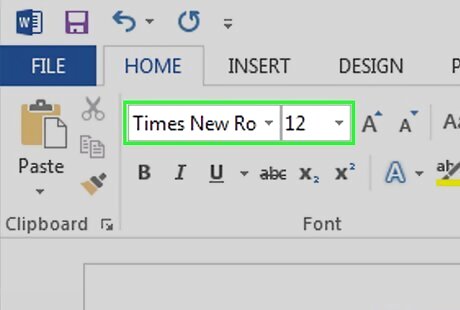
Use a legible font size and style. Choose a font that is easy to read. Use a 12-point font in Times New Roman or Arial. Avoid a script-style font, as it is harder to read. Most publications on their website's submissions page will list guidelines governing font size and style. Be sure to follow these guidelines to increase your chances of getting published.
Submitting the Poem to Literary Journals and Magazines

Search for publications that might welcome your submission. Visit your local bookstore or library and flip through publications that look interesting. Notice where your favorite poets are getting published, and consider submitting to these publications. You can also search online or in your local newspaper for poetry publications based in your region.

Read the publication before you submit to it. Read at least one issue of the publication you are submitting to before you send in your poem. Confirm that the publication features the type of writing that you enjoy and feel a kinship with. Ask yourself, “Will my poem fit with the style and substance of this publication? Is my poem compatible with the type of writing I see here?” (This is not to suggest that you should tailor your work to conform to that of other people. You are, however, looking for a publication that would be comfortable accepting your poetry.) You may need to read several different publications to try to find one that seems like a good home for your work. Take your time and read several different publications until you find a few that suit your work.
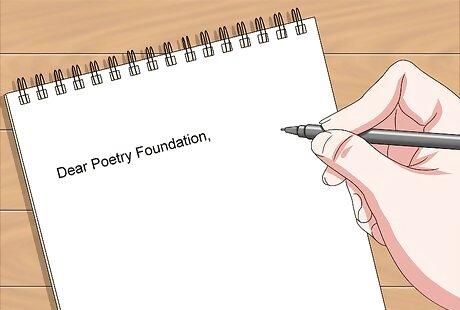
Write a brief cover letter. When you submit your poem to literary journals and magazines, they will ask you for a brief cover letter to go with your submission. Keep the cover letter short, only four or five lines long. Address it to the poetry editor at the publication if they are listed online or in print. If not, you can address the letter to the name of the publication. For example, you may write, “Dear Gabriel Blackwell” if that is the poetry editor’s name. You may write, “Dear Poetry Foundation” or "Dear Poetry Division" if you cannot find the poetry editor’s name. Include a short paragraph where you mention your submission and any publications that have accepted your work or awards you have received for your writing. Do not ask for feedback or comments on your poem in the cover letter. Avoid trying to summarize the poem or explain it. End the letter with “Sincerely” and your name. For example, you may write, “Please find attached my poem, ‘September,’ for your consideration. My work has appeared in Black Diamond Journal and Poetry Online. I have received a Stegner Fellowship and was a finalist for the 2017 Poetry Press Prize.”
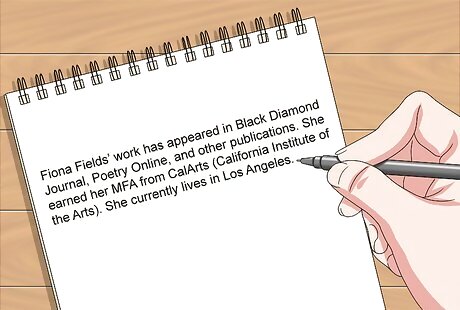
Include a short biography. You should also include a very brief biography in your submission that is no longer than four lines. State where you are from, and mention your education (if it's relevant) and your publications or awards. Include where you live and work now if you feel it is pertinent. For example, you may write, “Fiona Fields’s work has appeared in Black Diamond Journal, Poetry Online, and other publications. She earned her MFA from CalArts (California Institute of the Arts). She currently lives in Los Angeles.”

Submit the poem online. Most publications will have an online submissions system where you upload your poem through a portal called "Submittable." Look on the publication’s website for a Submissions Page or a less-formal call for submissions for an upcoming issue. The website should include a printed guideline for submissions and a link to the Submittable portal where you can upload your cover letter, biography, and poem. You can usually submit more than one poem at a time. Most publications will allow you to submit up to five pages of poetry in a single submission. Some publications charge a small "reading fee" for submitting to them, usually between $3 and $5. This reading fee helps the publication to pay their copyreaders and editors. In some cases you may need to pay more than $5 to submit to the publication. Decide whether you want to pay that much just to submit your work for consideration.

Send your poem by mail. Some publications will ask for a hard copy of the poem by mail. You will need to print out hard copies of your cover letter, biography, and poem on separate pages. Place them in an 8.5” by 11” (22 x 28 cm) envelope and address it to the publication. Include a self-addressed business envelope with a stamp so the publisher can easily reply to you. If you would like your work returned to you, include another 8.5” by 11” envelope, self-addressed with a stamp.

Enter your poem into poetry contests. Many publications will run contests where they let poets compete for cash prizes and publication in the magazine or journal. Winning a poetry contest would raise your profile as a poet and make your work more accessible to a wider audience. Check publications online for such contests. You can follow your favorite publications online through social media or by subscribing to them. Watch for any poetry contests advertised in the publication. Some contests will be themed or have a prompt for poets to respond to. There are sometimes guest judges, often high-profile poets or writers, who pick the best submissions. The submission fee for poetry contests will likely exceed the fee for regular submissions. Contest fees might run between $10 and $30.
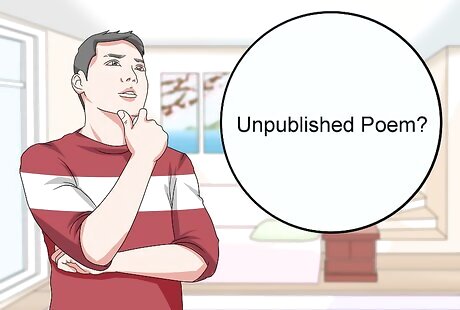
Confirm that your poem is eligible for publication. Whether you submit your poem online, by mail, or through a contest, be sure it is original, unpublished work. If the poem has appeared on your blog, website, or social media, a publisher may consider it previously published and not accept it. Do not submit work that is not yours or that has been published elsewhere. Some publications will allow you to make simultaneous submissions, where you submit the same poem to more than one publication at once. If your poem gets accepted by one publication, you should let the other publication(s) know and withdraw your poem from their consideration.
Self-Publishing the Poem

Post your poem on social media. If you’d prefer to publish the poem on your own terms, consider posting it on your Facebook, Instagram, or Twitter account. This will allow you to share the poem with your friends on social media in a quick and accessible way. Keep in mind that if you publish a poem on social media, you may not be able to submit it later to literary journals or magazines for publication.

Put the poem on your website or blog. If you have a writing blog or website that you maintain, put the poem on the site for your followers and readers to see. This may be a good option if you have a substantial number of readers who visit your blog every day. Encourage your readers to comment on your poetry. Respond to reader comments so your readers know you appreciate their presence on your site and that they took the time to read your work.

Create an ebook of poems. If you have several poems that you feel could be part of a collection, you can always self-publish the collection yourself. A poetry ebook can be made easily using a publishing program online like Smashwords or Amazon. You can then sell the ebook to readers using an online retailer. This is a good option if you’ve had a hard time finding a publisher for your poems and want to try doing it yourself.


















Comments
0 comment